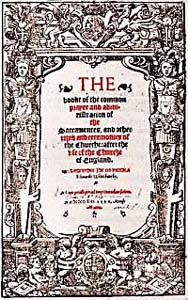A joyful and pleasant thing it is to be thankful.

"Book of Common Prayer" is the short title of a number of related prayer/prayer books used in the Anglican Communion, as well as by the Continuing Anglican, "Anglican realignment" and other Anglican churches. The original book, published in 1549 , in the reign of Edward VI of England/Edward VI, was a product of the English Reformation following the break with Roman Catholic Church/Rome. Prayer books, unlike books of prayers, contain the words of structured services of worship. The work of 1549 was the first prayer book to include the complete forms of service for daily and Sunday worship in English. It contained Morning Prayer (Anglican)/Morning Prayer, Evening Prayer (Anglican)/Evening Prayer, the Litany, and Holy Communion and also the occasional services in full: the orders for Baptism, Confirmation, Marriage, 'Anointing of the Sick/prayers to be said with the sick' and a Funeral service. It also set out in full the "propers" (that is the parts of the service which varied week by week or, at times, daily throughout the Church's Year): the collects and the epistle and gospel readings for the Sunday Communion Service. Old Testament and New Testament readings for daily prayer were specified in tabular format as were the Psalms; and canticles, mostly biblical, that were provided to be said or sung between the readings .
More Book Of Common Prayer on Wikipedia.With this ring I thee wed, with my body I thee worship, and with all my worldly goods I thee endow.
In the midst of life we are in death. Earth to earth, ashes to ashes, dust to dust.
To have and to hold from this day forward, for better for worse, for richer for poorer, in sickness and in health, to love and to cherish, till death us do part.
We have left undone those things which we ought to have done; and we have done those things which we ought not to have done.
There was never anything by the wit of man so well devised, or so sure established, which in continuance of time hath not been corrupted.
Copyright © 2024 Electric Goat Media. All Rights Reserved.